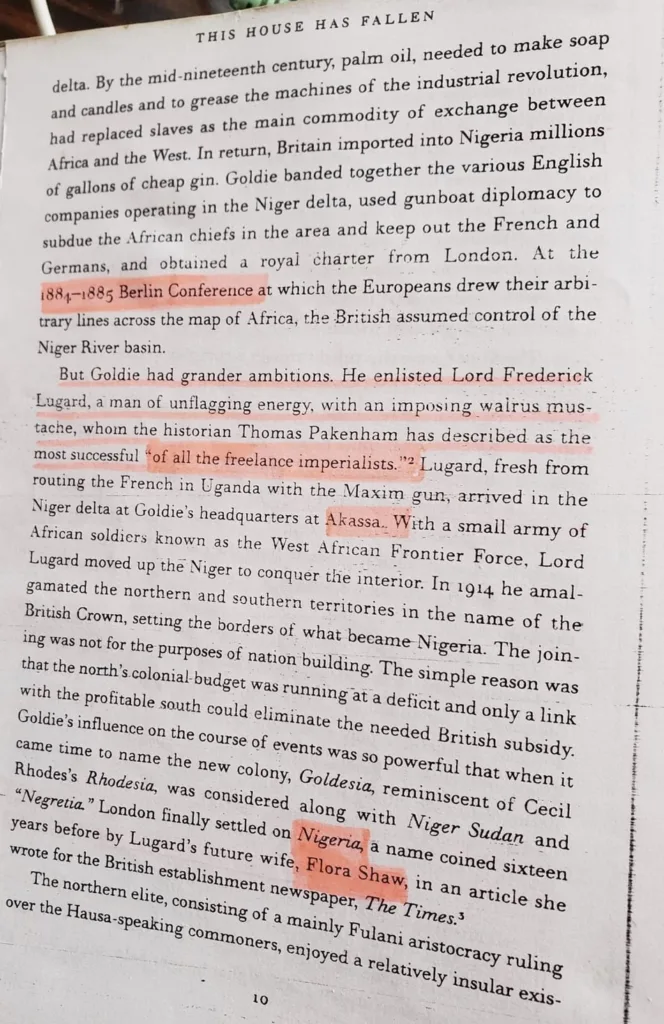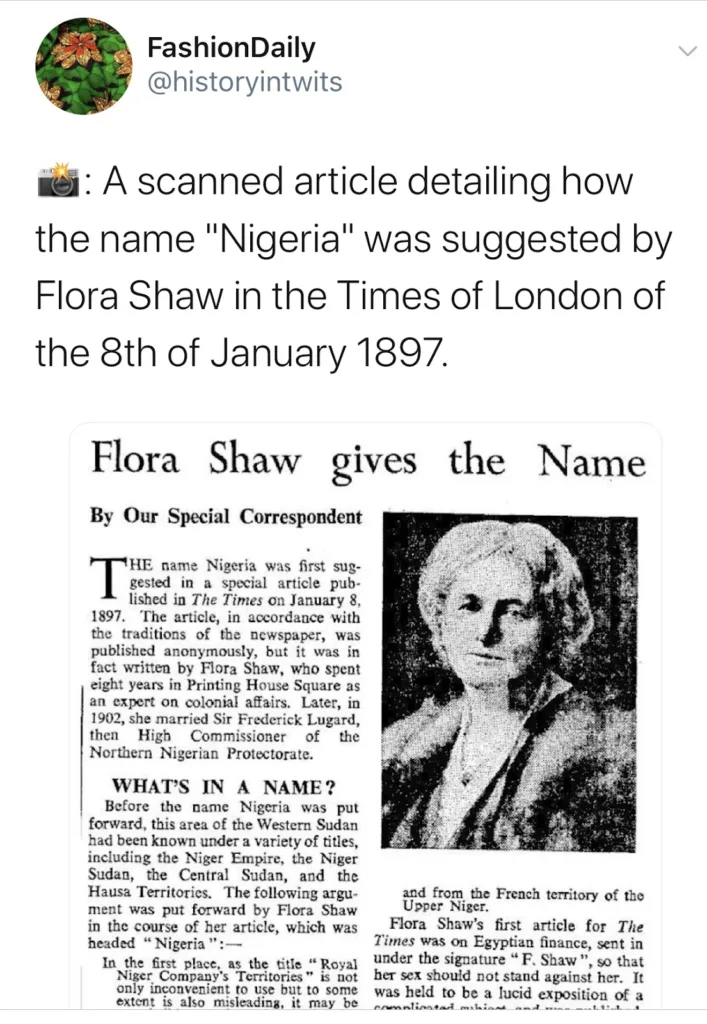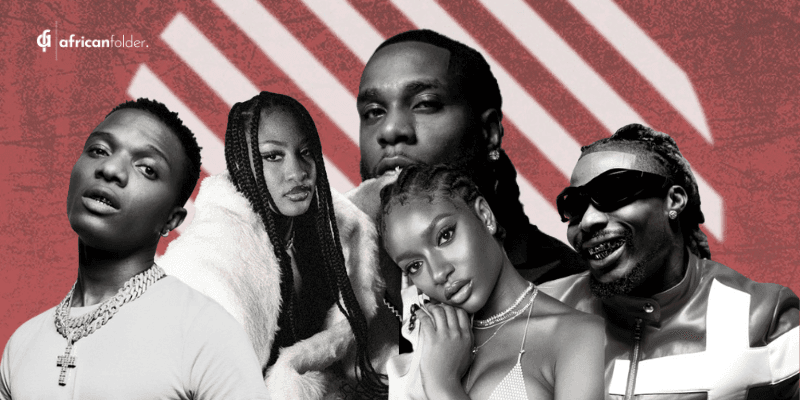Have you ever wondered how Nigeria got its name? It unravels a stunning narrative that not only touches the history and the cultural fabric of the country but also captures what makes it such a vibrant a nation with diverse tapestry. With us, the journey explored the genesis and importance of Nigeria’s name, a mission that goes beyond mere linguistics by probing deep into the historical, cultural, and geographical terrain that defines this great nation. This task will be undertaken together as we strive to reveal the many layers of meaning that encapsulate what Nigeria truly means in the development of the unique, national identity of a great, heterogeneous country.
Before settling on the name Nigeria, there were several alternative proposals, including Royal Niger Company Territories, Central Sudan, Niger Empire, Niger Sudan, and Hausa Territories.
The Meaning of Nigeria
At the very entrance of the Nigerian nomenclature is a shining star; the worldly renowned Niger River which deposits the endowments of West Africa. The name of Nigeria comes from the Tuareg word “Ni Gir,” meaning the river. This original river in the ancient days was viewed as a breadwinner and life-giver because it meanders through banks and sustains several rivers in the river system. Indeed, the mighty river acted as a major highway, a platform for trade and communication and a cradle for cultural interaction within the region. The Niger River has inscribed the history and determining destinies of the Nigerian community starting from its Guinea Highlands to its delta in the Gulf of Guinea thus becoming an important part and parcel of Nigeria’s landscape.
The History Of How Nigeria Got Its Name
The origin of the word ‘Nigeria’, which was coined by the British journalist and writer of the late 19th century, Flora Shaw, could be traced back to the day of 1897. This was when she referred to the region as “Nigeria” in her article that highlighted the unexploited potential of the area. Shaw’s aspiration of being able to unify the entity under the flag of British rule advertised the way to the merger of the British Protectorate of Southern Nigeria and Protectorate of Northern Nigeria, which in turn laid down the foundation for the actual birth of Nigeria. The historical event, where this peace deal was reached for the first time, is the point where Nigerian people decided to shape their future by drawing from the myths of colonialism, the struggle for independence, and the quest for national unity.

The Flora Shaw Controversy
One of the most debated aspects regarding the name “Nigeria” is its origin as it has been associated with many versions ranging from the vague to the interesting. From the article which appeared in The Times of London in 1897, it is widely accepted that she was the one who coined the phrase but different views were born by people over whether she did that.

Author William Cole wrote “Life in the Niger” in 1862 and scholar Richard Burton worked in 1863 all showing the word sustainability was used before Shaw uttered it. Nevertheless, the possibility remains that the meaning when these terms were used, may be completely different from the modern connotation and in some instances was made by present-day curators.
Though the disputed understanding of the original name of the country is being played, the majority of the story follows the suggestion of Colum Flora Shaw for these territories to be managed by the Royal Niger Company. This inspired perception had also been adopted by Lord Frederick Lugard during the British colonial rule before the amalgamation of the Northern and Southern protectorates in 1914.
On the front of the UK’s National Portrait Gallery and through various historical records, Shaw’s naming of Nigeria attributed to her is pointed out, as she was the one who coined the name. Besides online platforms such as Karl Maier’s “This House Has Fallen” and the Nigeria Centenary Project, which endorses Shaw as the one who named the country, Shaw’s contribution remains undeterminable.
The influence and imposition of colonialists can not be understated about historical evidence that recommends the name “Nigeria”. However, a larger picture should be deepened to understand how colonialists shape the identity of African nations. The creation of the border of Nigeria between different ethnolinguistic groups showcases the complex issues engendered by the colonial enterprise and the making of new nations.
Nigeria’s Diversity
Diversity is my favourite word to describe Nigeria – a nation that can boast of a rainbow colour of cultures, languages and traditions all living harmoniously in one place. Nigeria is surprised with its rich history as it has 36 states, as well as the Federal Capital Territory of Abuja which –becoming a collage of many different ethnic groups with no one race dominating the whole nation, adds to the complex and colourful image of this country. It is through the exchange booths of Lagos exchange markets that slow towards the horizons of greenery that suggest the tranquillity of the Niger Delta.
Here are some FAQs:
Q: What does the name “Nigeria” mean?
A: The name “Nigeria” is derived from the Niger River, which is a crucial waterway in West Africa. The word “Niger” is derived from the Tuareg word “Ni Gir,” which means “river.”
Q: Who first used the name “Nigeria”?
A: British journalist Flora Shaw first used the name “Nigeria” in 1897.
Q: When was the name “Nigeria” officially adopted?
A: The name “Nigeria” was officially adopted in 1914 when the British Protectorate of Southern Nigeria and the Protectorate of Northern Nigeria were amalgamated.
Q: What is Nigeria’s population?
A: Nigeria’s population is over 200 million people, making it the most populous country in Africa and the seventh most populous country in the world.
Q: What is Nigeria’s cultural, ethnic, and linguistic diversity?
A: Nigeria is a federal republic composed of 36 states and the Federal Capital Territory, Abuja. It is home to over 250 ethnic groups, speaking more than 500 languages. The three largest ethnic groups are the Hausa, Yoruba, and Igbo.
Q: What was Nigeria called before Nigeria?
A: Before Nigeria, the region was known by various names, including the Kingdom of Nri, the Bornu Empire, and the Sokoto Caliphate, among others.
Q: What is the full meaning of Nigeria?
A: Nigeria does not have a full meaning as it is derived from the name of the Niger River. However, it is often interpreted as a combination of “Niger” and the suffix “-ia,” commonly used in geographical names.
In conclusion, we cannot help but acknowledge the prominent role which the Niger River plays and the visionaries who directed the fate of our country as a nation. Through inhaling the breath of Nigeria I have concluded that Nigerians have it in them- they have to be withheld because they are to be feared and respected as a powerhouse! Our role is to embrace the many ways Nigeria differ but is one people who all share the majestic cultural patchwork that draws everyone together. It is the umbrella of our nation that is the common faith that we all believe the country has the hope of a glorious future that will be passed on to the next generations.














